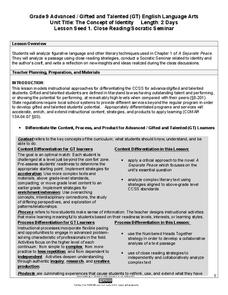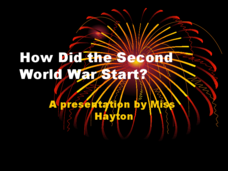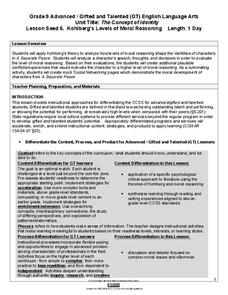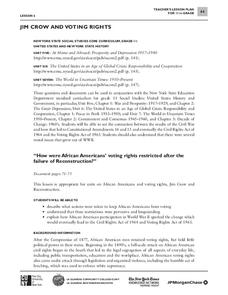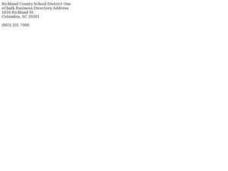Maryland Department of Education
The Concept of Identity Lesson 1: Close Reading/Socratic Seminar
John Knowles' A Separate Peace provides readers with an opportunity to develop their close reading and analytical skills as they look for what Knowles feels are the factors that shape our identity.
Curated OER
How Did WWII Start?
How did the second world war begin? A presentation first looks at the political climate that led to WWI and the effects of that war. Then, it describes the reason Hitler was able to take hold of Germany after WWI and prior to WWII. The...
Maryland Department of Education
The Concept of Identity Lesson 6: Kohlberg's Levels of Moral Reasoning
How does our moral reasoning shape our identity? After a study of Kohlberg's Levels of Moral Reasoning, readers use Kohlberg's theories to analyze the speech, thoughts, and decisions of a character in A Separate Peace. They then create...
City University of New York
Jim Crow and Voting Rights
Class groups examine primary source documents to determine how the voting rights of African Americans were restricted after the failure of Reconstruction, and how African American participation in World War II lead to change.
Student Handouts
Examining Primary Sources: Rudyard Kipling, “The White Man’s Burden” (1899)
Combine literature and history with the poem "The White Man's Burden" by Rudyard Kipling. Pupils read the poem and answer four questions about the text.
Maryland Department of Education
The Concept of Identity Lesson 4: The Psychological Approach
Readers apply Sigmund Freud's theories of the unconscious mind and the psychological approach to literary criticism to analyze and evaluate the relationship between two characters in A Separate Peace.
Curated OER
The July Crisis: Can You Stop the Great War?
Learners role-play as diplomats from countries involved in World War I who have received telegrams stating they must prepare presentations on their country's position about the war. They have 45 minutes to reach a peace accord, or they...
Curated OER
Negotiate Peace for India and Pakistan
Students prepare for a fake peace talk between India and Pakistan.
Curated OER
Simulating a Middle East Peace Summit
Tenth graders explore the issues in the Middle East. In this World History lesson, 10th graders research the problems between Palestine and Israel. Students write a speech on their point of view of the peace process.
Curated OER
Give Peace a Chance
High schoolers research protest songs of the Vietnam War era. They search for information on the artists and motivation for the lyrics. They interview people who remember the music from that era and bring back information they found.
National First Ladies' Library
Martha Goes To War!
High schoolers investigate how women went to war and the contributions that they have made in history. They conduct research using a variety of resources. The information is used in order to create a class presentation and answer some...
Curated OER
Can We Live in Peace? Middle East: A Region in Turmoil
Seventh graders analyze three monotheistic religions as an appreciation of the Middle East. For this world religions lesson, 7th graders analyze the beliefs and the leaders of the three major religions. Students research a topic and...
Curated OER
Give Peace A Chance: Nonviolence as a valid strategy for social change
Students analyze how people solve conflicts. In this conflict resolution lesson, students look at Mahatma Gandhi and Martin Luther King's nonviolence movements. They see the reasoning behind nonviolence and how it works.
Curated OER
Fort Pickens and the Outbreak of the Civil War (38)
Students discover why Fort Pickens was so valuable to both the Union and Confederacy, and follow the actions of the military commanders faced with crucial decisions. (National Park)
Curated OER
Voices of Hope and Seeds of Peace
Students read reflective essays to gain an understanding of the experiences of young people growing up in an area at war. Students locate groups who bring together opposing sides in a conflict for purposes of reconciliation.
Curated OER
My Country at the Crossroads to Peace
Students discuss issues with regard to different ways their countries are affected at the cross roads to world peace. They write prose pertaining to issues relating to unpeaceful situations in the world.
Curated OER
The Reality of War
High schoolers use research materials developed earlier. They synthesize data to formulate an argument for or against war. Students use their notes to address what the possible answers could be.
Curated OER
Total War
High schoolers view a video about the result of using atomic weapons during World War II. They examine how human rights are violated during wartime. They listen as family members come and speak to the class about their experiences...
Curated OER
1960 America: Foreign Policy
The 1960's marked shifts in American culture, politics, and policy. Your class groups up to research a series of primary source documents resulting in a timeline and a 15 minute oral presentation. Active learning all the way.
Curated OER
The Arab-Israeli Conflict
Provide your class with a context and series of events that has led to the conflict in the Middle East. They read 4 separate passages and answer 1 critical thinking question for each. Four more questions are posed at the bottom of the...
National Endowment for the Humanities
Victory and the New Order in Europe
A New Order in Europe calls for a new lesson plan! This third plan in a series of four sequential lessons encourages high schoolers to read primary sources about the development of the New Order and follow up their knowledge with a...
Curated OER
The Kennedy Administration
From his inaugural speech to the Bay of Pigs, major events concerning the Kennedy presidency are discussed. Slides provide an array of images and web links to highlight some of the bigger issues surrounding President Kennedy. The...
Maryland Department of Education
The Concept of Identity Lesson 7: Logical Fallacies
What are the effects of competition in an academic environment? The competition between the main characters in A Separate Peace motivates a series of activities that asks readers to take a stance on competition, and then to develop a...
iCivics
Foreign Policy: War
What is the difference between foreign and domestic policy? What are the primary differences in what the United States hopes to accomplish through foreign aid, the military, and the creation of treaties? Your class members will examine...
Other popular searches
- War and Peace Tolstoy
- 1980s War and Peace
- Drama War and Peace
- Russia War and Peace
- War and Peace Tplstoy
- War and Peace Activities
- World War I Peace
- Peace or War Songs


